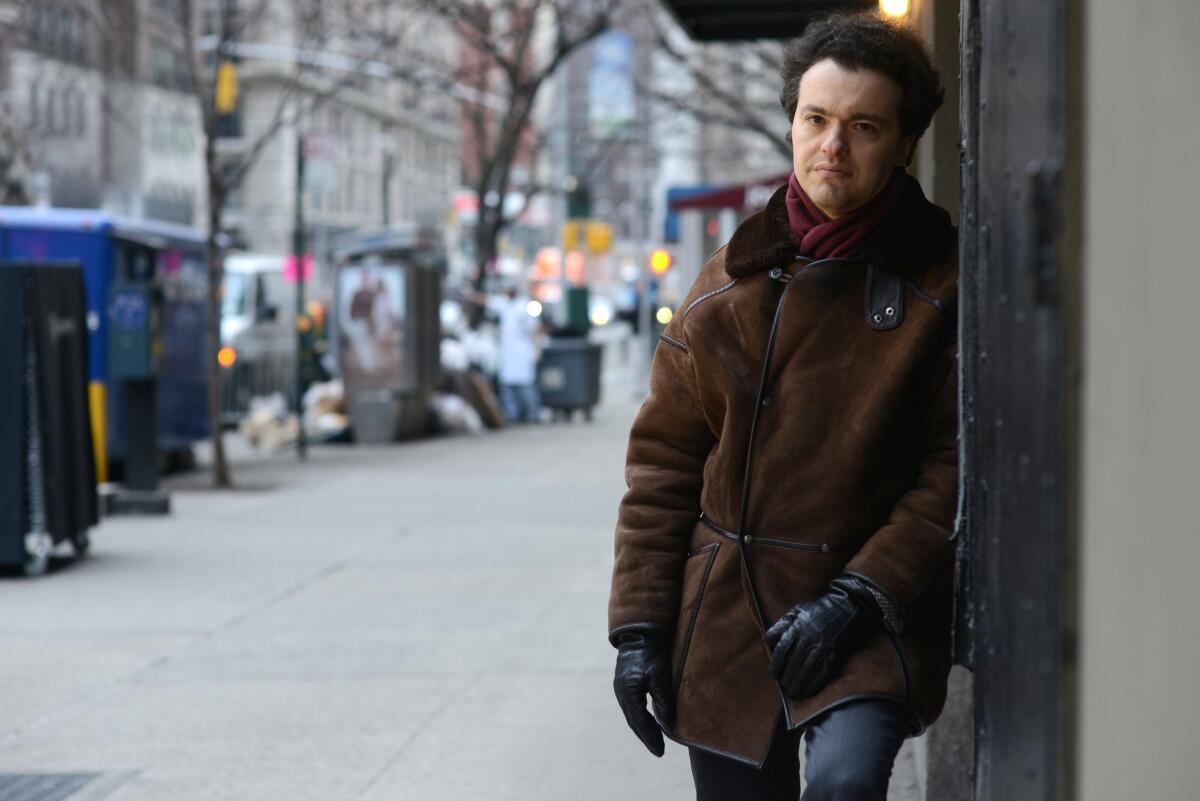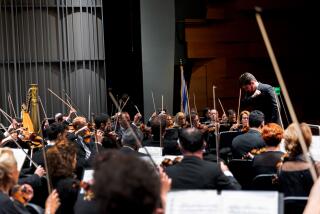Pianist Evgeny Kissin aims to communicate love of classical music

- Share via
NEW YORK — Pianist Evgeny Kissin speaks many languages, but to audiences around the world he is best known — and in some circles, revered — for his ability to articulate, with precision, the greatest scores of the classical piano repertoire.
Talking with the Russian-born artist on New York’s Upper West Side a few days before a sold-out solo recital at Carnegie Hall (the program of Scriabin and Schubert will repeat at Disney Hall on Monday), it becomes immediately clear that Kissin’s mind is hard-wired for accuracy.
A casual question about New York causes Kissin to furrow his brow. “When I first came here in 1991, I lived nearby on…” He then looks out the window and ponders for an almost awkward amount of time. “On 75th and Columbus!” he exclaims. He continues matter-of-factly, “And I live there 11 months until the owner — who was a Broadway show conductor, by the way, in Los Angeles — until he wanted to sell. He said I could buy it or leave. I was not interested, so I found another apartment where I lived for four years.”
SPRING ARTS 2014: Classical music picks
The 42-year-old pianist is famous for his long hours of practice and his commitment to make each performance better than the last. He has been performing the pieces he will play at Walt Disney Concert Hall since the fall and will continue touring with them through the summer. But he doesn’t find playing the same music day after day tiresome.
“I don’t get tired because it improves from one concert to another — and moreover, from one tour to another,” he says. “Now I feel I’m playing better than a few months ago.”
Kissin is no less exacting answering questions about himself than he is in his performances. Despite his heavily accented speech (and perhaps related to a speech impediment in his youth), he works hard to make sure nothing is lost in translation.
“I have always tried to make things clear,” he says after another long pause. “Everything I perform is close to my heart, otherwise I wouldn’t play it well.”
Closest to his heart, he says, is Chopin. (Those who are patient Monday night at Disney Hall will hear Kissin play a majestic Polonaise as an encore.)
This program of Schubert and Scriabin sonatas plus a selection of colorfully rendered etudes by the latter composer certainly illustrates Kissin’s communication skills with a Steinway (after the Carnegie concert, a prominent Manhattan conductor could be heard saying, “That was perfect, just perfect.”)
FULL COVERAGE: Walt Disney Concert Hall at 10
Chicago Tribune critic John von Rhein has written that Kissin “has gone from cloistered prodigy to fan-besieged superstar to idiosyncratic thirtysomething whose wrong-headed recordings... (I think particularly of his Rachmaninoff Third Concerto) made you worry, for a time, that he was squandering his colossal gift... Though still remarkably boyish in appearance, Kissin has emerged as a musician of deep musical and poetic sensibility to match his sovereign technique.”
What concertgoers might not know about the pianist is that he doesn’t just speak the language of romantic piano music.
Kissin broke out of his standard virtuoso performer mode last month at a concert in Washington, D.C., where he not only played the piano but also recited poems in Yiddish.
Despite excellent notices for this performance — and offers to repeat the program in other cities — Kissin is modest about the endeavor. “I have always tried to make clear, and will continue to make clear, that reciting poetry is only my hobby, whereas playing piano is my profession,” he says.
Kissin taught himself Yiddish after he had already embarked on an international career. He became a national hero in the USSR at age 12 when he performed Chopin’s two piano concertos at the Great Hall of Moscow’s Conservatory. By the time he recorded Tchaikovsky’s First Piano Concerto with Herbert von Karajan at age 17, he was only starting to learn the Yiddish alphabet.
When asked about his ability to learn, Kissin responds — again with deliberation and not a trace of glibness: “When there’s a will, there’s a way.”
PHOTOS: Arts and culture in pictures by The Times
Since leaving Russia for the West in 1991, he also learned to speak English, French and German. Language is something that clearly matters to Kissin.
“One of the founders of the Zionist movement, Vladimir Jabotinsky, he used to write and give speeches in many languages. He used to say that he did not, being a Zionist, consider Russia to be his country, but a few years before his death, he said that Russian was the language in which he was able to express his thought best,” he says. “And I feel a similar way regarding the Russian language.”
After his Carnegie recital, that was clear. Backstage, Kissin received flocks of people outside his dressing room, and while he handled all of his many well-wishers with grace, he seemed particularly fond of his interactions with his Russian-speaking fans.
“Not often do I go to Russia,” he says, “but I still think in Russian, I grew up in the Russian culture. I still feel that Moscow is my city when I’m there.”
Kissin has never given up his Russian citizenship, even when he became an Israeli citizen as well last year. “Being Jewish I have always felt that Israel was, in a way, my country,” he says, “so there came a point when I just felt that natural urge to take up Israeli citizenship.”
Kissin has no plans to move to Israel — in fact, he has no plans to permanently settle down anywhere. “I don’t dream of being in one place, I’m quite happy the way things are,” he says about his life on tour. “That doesn’t mean I’d like to live in all the countries where I perform. It’s who I’m with. When the people I love are near me, I feel at home. It’s not a matter of place.”
CRITICS’ PICKS: What to watch, where to go, what to eat
Since his days as a child prodigy, Kissin has lived with his family. His mother, who was backstage greeting throngs of fans after his Carnegie Hall performance, is a constant presence. Also close is his longtime piano teacher Anna Pavlovna Kantor, who often travels with him.
For Kissin, the learning process never ends. “I have never played any of Bach’s original pieces in concert. Of all Mozart’s piano music I’ve only played one sonata and four concertos, I’d like to do many more.” He then goes on to exhaustively list many other pieces and composers he wants to learn and play.
Despite being on the international scene now for almost 30 years, Kissin maintains an almost boyish enthusiasm at the thought of mastering a sonata of Beethoven or Hadyn. “I certainly listen to many living composers although I think most of them don’t write much for solo piano,” he says.
The one question Kissin doesn’t struggle to answer is a more philosophical one. When asked what he looks forward to in his life and career, his answer springs from him as naturally as one of his rippling arpeggios: “I only hope that I live long enough to have time to learn everything I want to learn.”
More to Read
The biggest entertainment stories
Get our big stories about Hollywood, film, television, music, arts, culture and more right in your inbox as soon as they publish.
You may occasionally receive promotional content from the Los Angeles Times.










